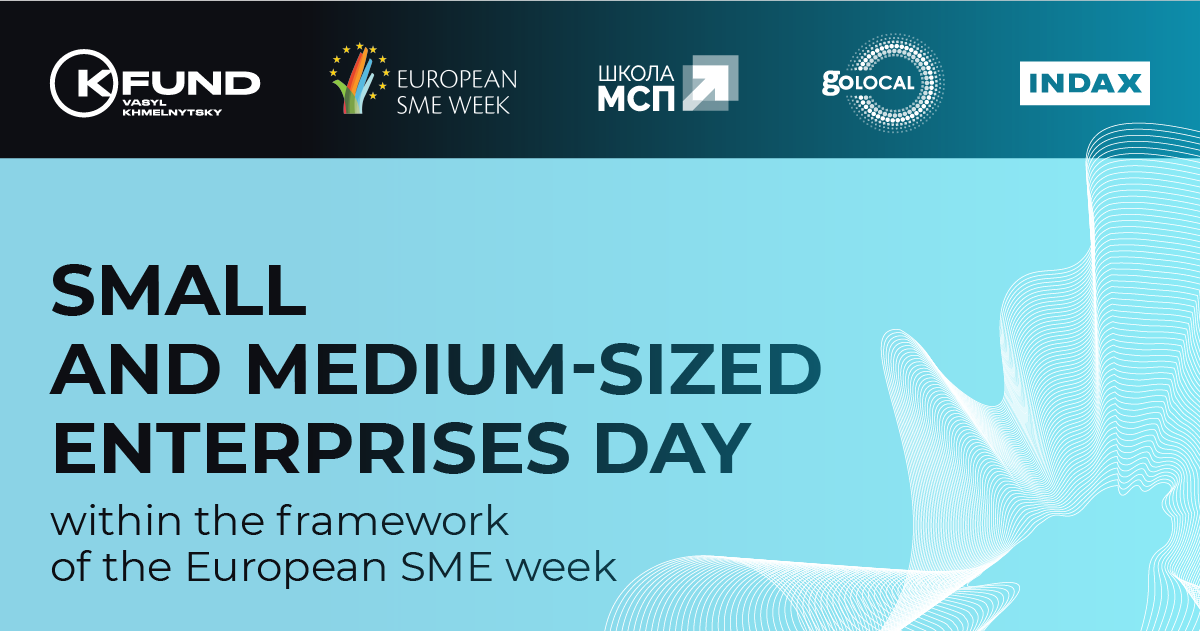TIPS FOR SUCCEEDING IN BUSINESS: REAL CASES FROM THE K.FUND’S SME DAY

The pandemic forced us to find our hidden reserves, change, start implementing non-standard solutions that we had never thought about before, said during a speech at the Day of Small and Medium Entrepreneurship in K.FUND, Vasyl Khmelnytsky’s foundation, director of International Operations at Ukrposhta and founder of E-Export School Yulia Pavlenko.
K.FUND’s president and School of Small and Medium Entrepreneurship’s head Lidia Pashchuk said at the opening of the conference:
“In business, especially service business, in times of a pandemic, there are only two ways: either to close, or, if you, for example, a restaurant, to invent new services and formats of work – ghost kitchen for example. And also to enter foreign markets and export.”
How Ukrainian small and medium business coped with the pandemic challenges was discussed by the speakers at the first panel of the conference “Markets for small and medium enterprises: exports, marketing, development”:
- Andriy Nimets, Commercial Director of Milltrade S.A., a trader in oilseeds, with 7 years of experience in exporting agricultural goods from Ukraine: “In fact, lockdown has affected Ukrainian exports in a positive way. During the pandemic, the image of Ukraine in China and Europe got better. People saw that business could be run online without spending time on business trips. This is a huge time saver for company executives and entrepreneurs. This is said at every Zoom meeting. Therefore, I believe that our industry has benefited from the lockdown. Ukrainian products are valued on the international market as environmentally friendly.”
- Yulia Pavlenko from Ukrposhta: “There is a large American online handmade platform, where many Ukrainians sell their products, Etsy. Etsy realized that the pandemic was their time. They made an advertising campaign on television and doubled their customer base. During the advertising campaign, they had up to 500 million people who came in all the time and bought something on the platform. They used lockdown as a driver. Many Ukrainian producers said that in the summer they had sales at the level of the Christmas holidays. So the pandemic forced us to find our hidden reserves, change, and start implementing non-standard solutions that we had never thought about before.”
- Natalia Paslavska, founder of the MakeMeWOW beauty salon network and Lavender Dreams, home and leisure clothing brand: “I opened my third salon during the red lockdown period in Kyiv two weeks ago. At Etsy, our brand last year had a growth of 60%. We are lucky because we have a brand of home clothes. What else to buy in a pandemic, other than home clothes? That’s why I used this chance 100%.”
Introduction of innovations
“How to introduce innovations in companies? There are several methods. Large corporations build innovation departments that hardly intersect with the company's core staff. Other companies use outsource. The rest make hackathons,” said Olena Dobrorodneva, Director of the Organizational Development Department of UFuture holding company, during the panel “Search for innovative solutions and new products”.
Hackathons are not just about IT. Hackathons can be held at the request of a non-profit organization or production company. Hackathons are interesting for completely different ages. They are the future gyms for everyone, and everyone will take part in them, added Olena Rantsevych, co-founder of the Method Placer incubator, Stockholm Studios intellectual colliving and former head of Samsung Electronics’ Belarusian office.
Under each hackathon, under each task the matrix of scenarios is created. It helps to reach the purposes. Mankind is approaching the so-called era of imagination, when creativity will create new economic values, she added.
“When you work in business, you mostly train your rational part of the brain. After all, in business you need to achieve results, do your duties. In such operational, rational tension the person is gradually exhausted. But we want to stay strong, we want to move forward. I think that the disclosure of our irrational potential just reveals our internal resources,” Olena Dobrorodneva summed up.
Business partnership
Speakers Taras Demkura, businessman and philanthropist, vice president of ICC UKRAINE, Daria Mustafina, director of the Institute of Partnership and Sustainable Development, founder of the Academy of Women’s Leadership and Entrepreneurship Inspiring Women, Igor Yasko, WINNER partner and lawyer, Olena Mytnyk, project manager of the non-profit organization GoLOCAL, spoke about partnership as a tool for business scaling.
Top 3 tips for success in partnership, which the speakers named:
- Taras Demkura: reputation, permanent development, innovations;
- Daria Mustafina: win-win approach, decency and creativity.
- Olena Mytnyk: responsibility, understanding of the value of the partner, willingness to benefit from the diversity of the team.
- Igor Yasko: set the cooperation at the start, fully legal formalization, common goals and openness.
The Day of Small and Medium Entrepreneurship in the Vasyl Khmelnytsky Foundation K.FUND was held for the second time as a part of the European Entrepreneurship Week, an all-European campaign to promote entrepreneurship.
See the full version of the conference at the link.